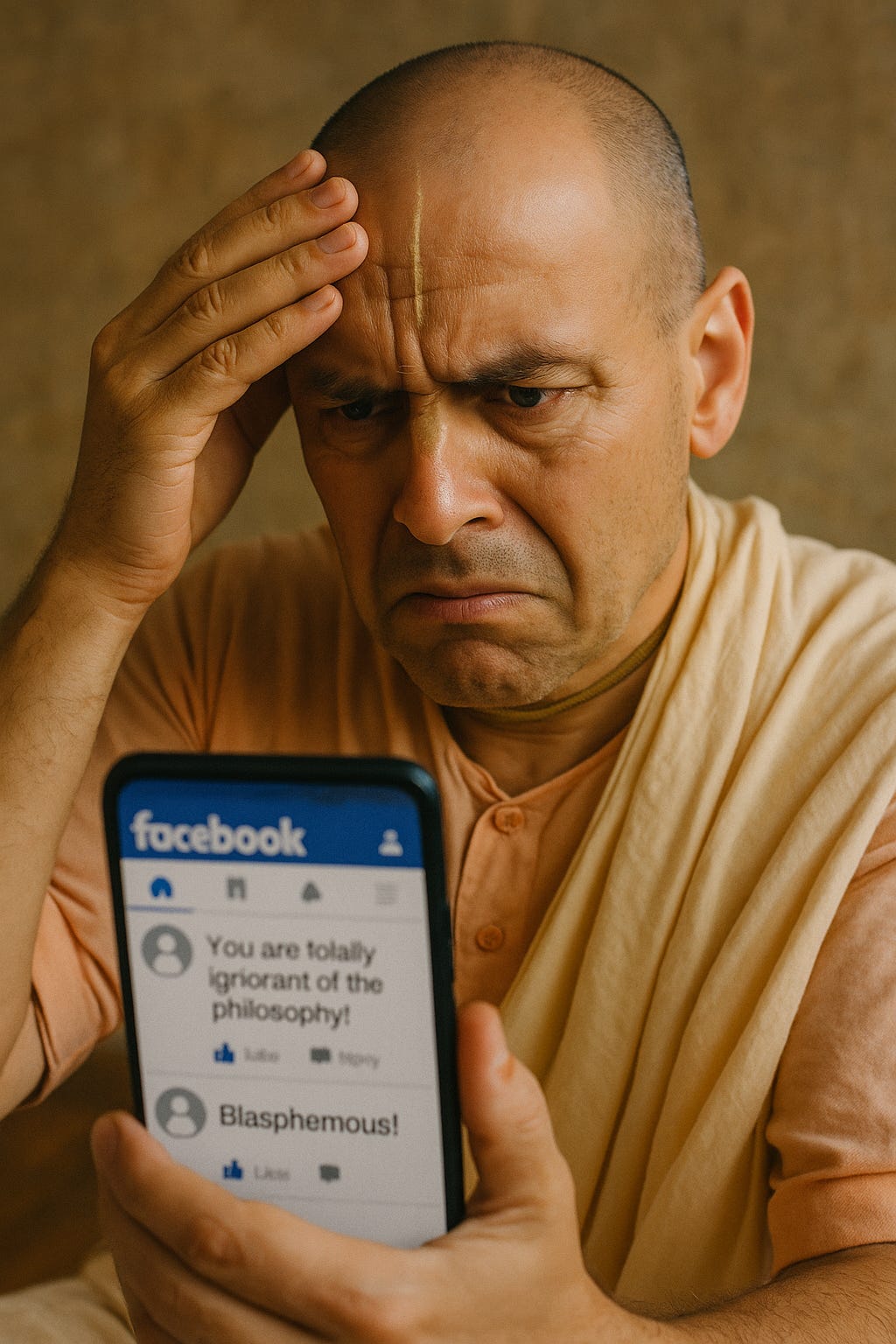Digital Disinhibition and Vaiṣṇava Etiquette
The term digital disinhibition describes the psychological phenomenon where people express themselves more openly or aggressively online than they would in person. In devotional circles, this has meant that subtle disagreements about siddhānta become bitter online debates. Pride, sarcasm, and anger find expression more easily without the softening presence of face-to-face interaction.
What should be sādhu-saṇga—association to uplift and inspire—often becomes a platform for putting others down in the name of “truth.”
Blasphemy in the Digital Dham
In real life, devotees might respectfully agree to disagree. Online, disagreements become spectator sports. It’s common to see devotees label others as ritviks, sahajiyās, or even demons. These labels aren’t just harsh—they’re spiritually dangerous.
This brings us to one of the gravest concerns in Kṛṣṇa consciousness:
Vaiṣṇava-aparādha: Offense to a Devotee
Vaiṣṇava-aparādha, or offending a devotee, is considered more spiritually damaging than offending the Lord Himself.
“nāma-aparādha-yuktānāṁ nāmāny eva haranty agham
avidvāṁs nāma-ratnaṁ hi nāparādha-yutaṁ smaret”
(Padma Purāṇa)“The holy name itself can remove all sins—even those committed while chanting—except the offenses committed toward devotees. These must be avoided at all costs.”
Srila Rūpa Gosvāmī warns of this in the Upadeśāmṛta:
“yasya prasādād bhagavat-prasādo
yasyāprasādān na gatiḥ kuto ’pi”“By the mercy of the devotee one receives the mercy of Kṛṣṇa, but without their mercy, there is no advancement at all.”
Vaiṣṇava-aparādha isn’t just about cursing or slandering. It can include subtle criticism, disregarding someone’s service, or undermining another's faith. On social media, these actions often occur through sarcasm, “call-outs,” or public debates framed as concern for truth, but laced with contempt.
“Śrī-caitanya-mahāprabhu kahe—‘vaiṣṇava aparādha
nāhi yāya gauracandra kahe—eta bhaya-sādha’”
(Caitanya-bhāgavata, Ādi 9.250)“Lord Caitanya said: Vaiṣṇava aparādha is so dangerous that even He fears it.”
Social Media’s Role: Division by Design?
While not everyone believes in conspiracy theories, it’s no secret that major platforms profit from division.
In 2021, former Facebook employee Frances Haugen leaked internal documents showing that Facebook’s algorithm favored “angry” reactions over likes—by five times. More outrage meant more clicks, more scrolling, more ad revenue.
In this environment, the humble voice of reason doesn’t trend. The angry post does. This digital structure isn’t built for sāttvic communication; it rewards conflict, polarization, and ego.
Satya-sa: The Virtue of Always Speaking the Truth
In the age of opinion, it is revolutionary to simply speak the truth.
Satya-sāra means to speak what is essential and true, without distortion. It does not mean brutal honesty or passive aggression. It means speaking with integrity, from a place of alignment with dharma.
This is what OvationHub—or any sacred digital space—ought to model: that we speak truthfully, kindly, and without ad hominem attacks.
Ad hominem arguments, by nature, are untrue. They are not based on fact, but on projected interpretations about someone’s motives, identity, or inner world. They use made-up stories and names. If someone dismisses a devotee as “a narcissist” or says they are “mentally ill” or calls them “a cultist,” these are not truths—they are unverified labels, and therefore not satya.
“We live in a world of names.”
(Bhāgavatam 11.28.16–17 paraphrased)
The Bhāgavatam tells us we live in a world of names—namarnamar\u016pa* (name and form). These names often define our illusions, not our reality.
To speak the truth, then, is to speak without labeling, and to stay with what we actually know.
If someone makes a philosophical statement, and another person replies by attacking their mental health, their community, or their personality, they are no longer responding to the actual idea. They are inventing a new story. And that is a lie.
To avoid rāsa-aparādha or vaiṣṇava-aparādha, we simply have to return to the essential spiritual practice: speak what is true, and only what is helpful.
Truth is protective. It builds clarity. It builds trust. All else is just a fog.
Opinions vs. Truth: Only Two Things Are Real
It’s easy to get caught up in opinions, but in spiritual life, most opinions simply don’t hold weight. There are only two things that are ultimately true:
The individual soul (jīva), and
The Supreme Soul (Paramātmā).
Everything else—social media labels, personal theories, ideological camps—is made up. Ephemeral.
“dharmaḥ svanuṣṭhitaḥ puṁsām viṣvaksena-kathāsu yaḥ
notpādayed yadi ratiṁ śrama eva hi kevalam”
(Śrīmad-Bhāgavatam 1.2.8)“Even perfectly executed duties are useless if they don’t awaken love for God.”
The same applies to opinions. If they don’t lead to love for God or love for His devotees, they are just noise.
The Real Cost: Faith, Trust, and Offense
When a devotee is publicly insulted online, it doesn’t just hurt the individual. It chips away at the collective culture of mutual trust and humility. It may also cause onlookers—especially newcomers—to lose faith in the movement altogether.
And the most serious cost is invisible: spiritual offense.
What Can We Do?
Use your feed consciously. Mute, unfollow, or block sources of conflict. Protect your heart like a gardener protects their garden.
Engage with humility. Before posting or commenting, ask yourself, Would I say this in front of my guru? If not, it’s not fit for public dialogue.
Correct in private. Praise in public. Srila Prabhupāda often stressed correcting devotees privately. Public shaming is rarely effective—and often damaging.
Speak with rigor!
Definition
rigor
noun
when you look at or consider every part of something carefully to make certain it's correct or safe.
Final Reflection: Truth Builds, Stories Destroy
When we argue online, we're usually not defending Kṛṣṇa's truth—we're defending our own story. And stories can be dangerous when they become fixed in the mind as truth.
Vaiṣṇava culture is built not on argument but on śravaṇam (hearing), saṇga (association), and seva (service). Social media gives us a chance to practice all three—or destroy all three.
Speak less. Hear more. Say only what is true. And remember:
A real devotee doesn’t need to win the argument. They win the heart.




